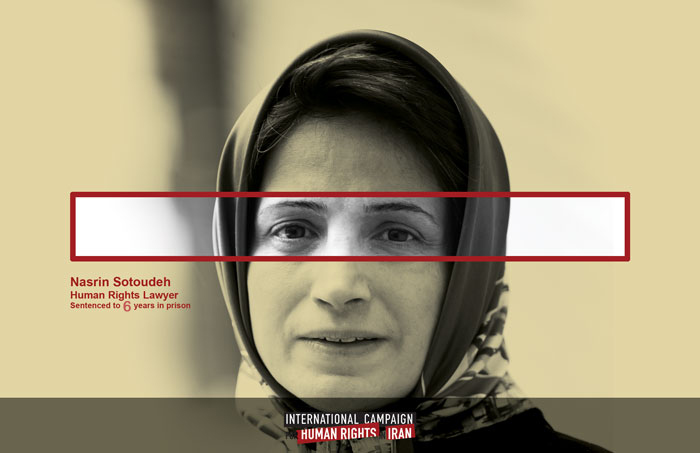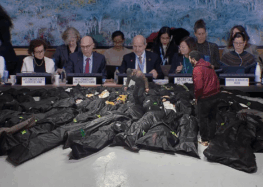Sotoudeh’s Health Critical, Intelligence Says “Continue Hunger Strike to the End!”

“Since we met her yesterday, I realized that she has reached a dangerous phase. The Intelligence Ministry representative who met with her on the first day of her hunger strike told Nasrin, ‘We suggest you continue your hunger strike all the way to the end.’ The meaning of this statement is welcoming her death. Up until last week, her weight had dropped to 43 kilograms (94.7 lbs), and she has surely lost a few more kilograms this week,” Khandan told the Campaign.
Imprisoned human rights lawyer Nasrin Sotoudeh, who has been on a hunger strike since October 17, told her husband that her health has deteriorated to the point where she is transferred to the prison infirmary every day. In an interview with the International Campaign for Human Rights in Iran, her husband Reza Khandan said, “The most visible thing was her severe weight loss, her gaunt face, and her hollowed eyes.” Sotoudeh has been on hunger strike for more than 40 days.
“Since we met her yesterday, I realized that she has reached a dangerous phase. The Intelligence Ministry representative who met with her on the first day of her hunger strike told Nasrin, ‘We suggest you continue your hunger strike all the way to the end.’ The meaning of this statement is welcoming her death. Up until last week, her weight had dropped to 43 kilograms (94.7 lbs), and she has surely lost a few more kilograms this week,” Khandan told the Campaign.
Reza Khandan told the Campaign that during the more than 40 days since she started her hunger strike, Sotoudeh spent 20 days in a solitary cell, “where the conditions were grave-like, to be punished for her hunger strike…. The reason for Nasrin’s hunger strike is the judicial pressure that has been placed on me and [our daughter] Mehraveh through fabrication of a case, particularly on Mehraveh, where there can be no excuse for fabricating a case against her and banning her from leaving the country. She has stated that she will break her hunger strike when the case against Mehraveh is dropped and her foreign travel ban is lifted. In my case, she is keeping silent for now, unless they want to take further action [against me].”
About Sotoudeh’s health conditions in prison, the prisoner of conscience’s husband told the Campaign, “Nasrin’s physical conditions prior to her hunger strike were such that she was in no way prepared for a hunger strike. This is why during the first 40 days she had to be taken to the prison infirmary several times. During these transfers to the infirmary, they had to put her on IV several times. While the Tehran Prosecutor was denying that prisoners in the women’s ward were on a hunger strike, she was transferred to a solitary cell, where the conditions were grave-like.”
Khandan asked the Iranian authorities to lift the travel ban for their daughter, Mehraveh. “First, she is under legal age. Second, there are no charges or excuses here. Fabricating a case for a 12-year-old child inside Iran’s highest security court may be one of the strangest judicial phenomena in the world. All over the world, children are mistreated and abused on the pretext of social issues, but nowhere in the world does a child receive a fabricated political case on her mother’s account. It is customary in Iran for authorities to keep silent in face of problems, but once things enter a critical stage, [they step in] and deny the whole thing. The Judiciary Human Rights Council Secretary, Mr. Javad Larijani’s interview yesterday about Nasrin’s physical conditions indicates her critical condition. He said at the interview that Nasrin’s physical conditions are good,” Khandan told the Campaign.
At a press conference with Iranian and foreign media on Tuesday, Javad Larijani, Secretary of the Iranian Judiciary’s Human Rights Council answered the New York Times reporter’s question regarding Nasrin Sotoudeh’s conditions and her hunger strike as, “The report we have received is that she recently had a good visit with her family and that her physical conditions are completely good, too. We are thoroughly sensitive to any harm that could come to any prisoner, whether through a hunger strike or through other means. In her charges, there was something that reflected the opinion of the honorable judges. As you know, the Human Rights Council or any other organization is not allowed to interfere in judicial reviews. The case has to go through its natural process. The Prosecutor indicts and submits an indictment and the judge must review the case in the presence of lawyers.”
“Ms. Sotoudeh’s case has gone through its judicial process and the sentence is being carried out at this time. Some of the charges leveled against her are acting against the regime, contacts with individuals who are active against the regime, and abuse of the legal profession…. Other than Ms. Sotoudeh, we have seen cases where a profession was abused. For example, a teacher enters the terrorist PJAK grouplet, and when his case is reviewed, they say that a teacher has been imprisoned,” Larijani added.
Nasrin Sotoudeh, a human rights lawyer and activist, is one of the female inmates inside Evin Prison. She embarked on a hunger strike on October 17 to protest her conditions. Not only have her demands not been reviewed, she has been placed inside a solitary cell since Wednesday, October 31. Nasrin Sotoudeh was arrested on September 4, 2010, and was sentenced to 11 years in prison, 20 years’ ban on her legal practice, and 20 years’ ban on foreign travel. An appeals court reduced her sentence to 6 years in prison and 10 years’ ban on her legal practice.






